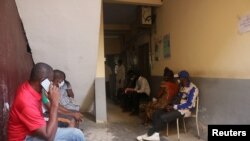Authorities in Cameroon are battling vaccine hesitancy with only eleven percent of doses received since April dispensed, most of them due to travel requirements. Cameroon's government and clergy have been struggling to get the public to accept that the vaccines are safe.
A group of 70 Cameroonian Muslims gathered at the Djoungolo government hospital in Yaoundé Friday to be vaccinated against COVID-19.
Coordinator of the Council of Imams and Muslim Dignitaries of Cameroon, Moussa Oumarou says vaccine hesitancy meant he had to convince the group.
He says Cameroon’s government asked the clergy to convince their followers that the vaccines could save their lives.
Oumarou says every religion that puts God first seeks to protect human lives. He says it is both a divine and civic obligation to protect lives by accepting to be vaccinated against the coronavirus. Oumarou says the council has asked all Imams and Muslim dignitaries in Cameroon to accept to be vaccinated and to encourage all their faithful to be vaccinated.
Cameroon health officials say only 75,000 people have been inoculated since April, when the government received 700,000 doses.
And most of the doses administered, say officials, went to people who were planning to travel outside of Cameroon, including expatriates.
37-year-old college teacher in Yaoundé Rigobert Fonbanla says many Cameroonians don’t trust authorities’ urging the jab after a COVID funds scandal and seizure of fakes.
"The same government that is asking people to accept to be vaccinated against COVID-19 is the same government that is investigating the authenticity and origin of the coronavirus vaccines," said Fonbanla. "There is a possibility that corrupt government officials may have imported fake COVID-19 vaccines or produced dubious COVID-19 vaccines. I will wait for investigations announced by the government to be complete before I can decide whether I will be vaccinated or not."
Most of a $335 million International Monetary Fund loan to Cameroon to fight COVID disappeared.
Last week at least 15 ministers were called up at the supreme state audit office to justify their management of the funds.
In December, Cameroon announced that its military seized several tons of fake COVID drugs and vaccines from neighboring Nigeria, raising fears that other fakes might be in circulation.
Cameroon’s Health Minister Manaouda Malachie says the COVID vaccines being used are good quality and recommended by the World Health Organization.
He says the vaccines are not obligatory but will be administered freely to all civilians who want to save their lives from the deadly coronavirus. Malachie says Cameroon’s President Paul Biya is very keen to have transparency on all COVID-19 vaccination procedures. He says the state of Cameroon cannot joke with the lives of its citizens.
To encourage Cameroonians to get the jab, hospitals in the northwest region in April said they would wave a usual $2 consultation fee.
In May, Cameroon’s government instructed all its ministers and senior officials to be vaccinated in public.





